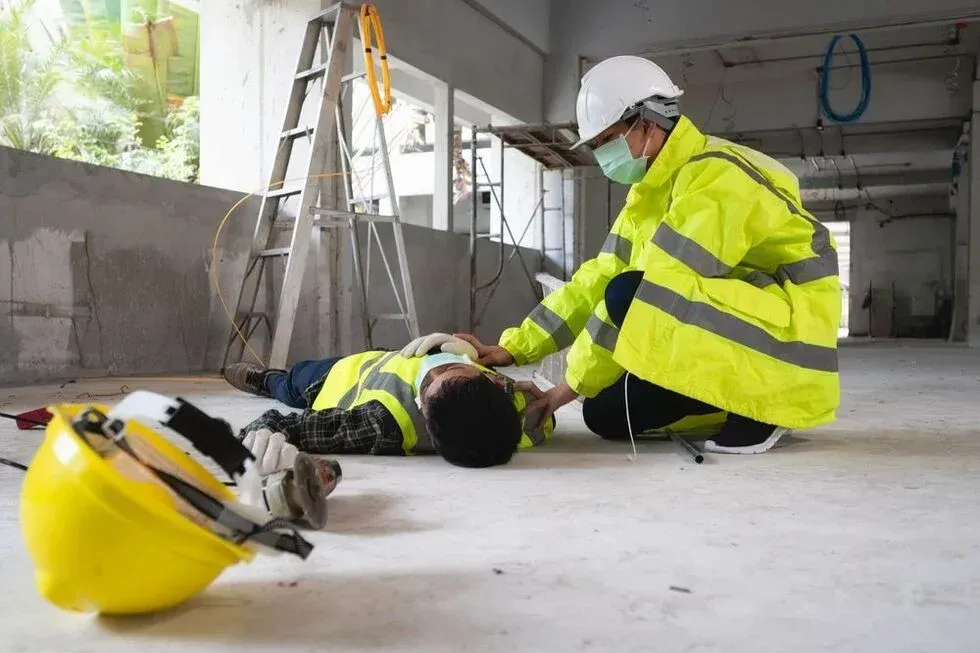Stay Safe All Year Round: Essential Workplace Safety Tips for Every Season
At Besse Law Office P.A., we understand that workplace safety is paramount, regardless of the season. The ever-changing weather brings unique challenges and hazards, from icy winter days to the scorching heat of summer. These challenges can affect the well-being of employees and the smooth operation of any business. Therefore, it is crucial to take proactive measures to address seasonal safety concerns, ensuring a secure work environment and preventing costly accidents or injuries. This comprehensive guide will explore key safety tips for winter, spring, summer, and fall, helping you protect your employees and your business throughout the year.

Winter Workplace Safety Tips
Prepare for Slippery Surfaces
Winter weather often brings snow, ice, and slush, creating hazardous conditions that significantly increase the risk of slips and falls. To mitigate these risks, it's essential to maintain clear and safe walkways. This involves regularly shoveling snow, applying salt or sand to icy patches, and ensuring that all entrances and exits are safe to use. Employers should also encourage employees to wear appropriate footwear, such as non-slip shoes or boots, to enhance traction and reduce the likelihood of accidents. Additionally, installing absorbent mats at entrances can help minimize wet floors, while prominently displayed caution signs can alert employees and visitors to potentially slippery areas.
Heating and Ventilation
As temperatures drop, maintaining a comfortable and safe indoor environment becomes critical. This involves ensuring that all heating systems are functioning correctly and receiving regular maintenance checks. Proper ventilation is also crucial, as it helps prevent the buildup of harmful fumes and ensures a steady flow of fresh air. When using space heaters, it's important to keep them away from flammable materials and ensure they have automatic shut-off features to prevent overheating. Regular inspections and maintenance of HVAC systems are essential to ensure they operate efficiently and safely throughout the winter months.
Emergency Preparedness
Winter storms can disrupt power, transportation, and communication, making emergency preparedness a key aspect of workplace safety. Businesses should equip their premises with emergency kits containing essentials like flashlights, batteries, blankets, and non-perishable food. These kits should be easily accessible and regularly checked for expired or depleted supplies. Establishing a clear communication plan is also vital, enabling employers to quickly notify employees of office closures or changes in operating hours due to severe weather. Regularly conducting emergency drills can help ensure that all staff members are familiar with evacuation procedures and other safety protocols.
Spring Workplace Safety Tips
Allergies and Air Quality
Spring can be a challenging season for those with allergies, as pollen counts rise and air quality fluctuates. To maintain a healthy workplace, it's essential to keep HVAC systems clean and replace filters regularly. This not only helps remove allergens from the air but also ensures the system operates efficiently. Providing allergy relief items, such as tissues and over-the-counter medications, can also help employees manage their symptoms. Employers should encourage staff to report any issues with air quality so that appropriate measures can be taken promptly.
Outdoor Work and Landscaping
With the arrival of spring, many businesses undertake outdoor projects, including landscaping and maintenance. It's crucial to prioritize safety during these activities by ensuring that all employees wear the necessary protective gear, such as gloves, goggles, and sun protection. Before beginning any work, inspect tools and machinery to confirm they are in good working order and pose no safety risks. Providing proper training on equipment usage and safety protocols is also essential to prevent accidents and injuries.
Pest Control
As temperatures rise, pests such as insects and rodents may become more active, posing potential health and safety risks in the workplace. To prevent infestations, businesses should schedule regular pest control inspections and services. Additionally, sealing any gaps or cracks in the building's exterior can help prevent pests from entering. It's important to maintain a clean and tidy workplace, as clutter and food scraps can attract unwanted visitors. Implementing these preventative measures can help maintain a healthy and pest-free work environment.
Summer Workplace Safety Tips
Heat Stress and Hydration
The summer months can bring extreme heat, posing a significant risk of heat-related illnesses such as heat exhaustion and heat stroke. To protect employees, businesses should provide ample water stations throughout the workplace, encouraging frequent hydration. Scheduling regular breaks in shaded or air-conditioned areas can also help employees cool down and recover from the heat. Employers should educate their staff on the signs and symptoms of heat-related illnesses, such as dizziness, fatigue, and nausea, and ensure that appropriate first aid measures are available if needed.
Sun Protection
For employees who work outdoors, sun protection is a critical aspect of workplace safety. Prolonged exposure to the sun's ultraviolet (UV) rays can increase the risk of skin cancer and other health issues. Employers should provide broad-spectrum sunscreen with a high SPF rating and encourage its frequent application. In addition, supplying protective clothing, such as hats, sunglasses, and long-sleeved shirts, can help minimize UV exposure. Employers should also consider adjusting work schedules to avoid the peak sun hours when UV radiation is strongest.
Electrical Safety
The increased use of electrical devices, such as fans and air conditioners, during the summer can strain electrical systems and increase the risk of fires. To prevent electrical hazards, businesses should avoid overloading outlets and ensure that power strips are used correctly. It's also important to regularly inspect wiring and electrical systems for signs of wear and tear, such as frayed cords or exposed wires. Any damaged equipment should be repaired or replaced promptly to prevent accidents. Additionally, ensuring that all electrical devices are properly grounded can help prevent electrical shocks.
Fall Workplace Safety Tips
Slip and Trip Hazards
As leaves begin to fall and daylight hours shorten, slip and trip hazards can become more prevalent. Wet leaves on walkways and reduced visibility can increase the risk of accidents. To address these hazards, businesses should implement a regular maintenance schedule to clear leaves and debris from sidewalks and entrances. Ensuring that all areas, including parking lots and outdoor walkways, are well-lit can help improve visibility and reduce the likelihood of trips and falls. Employers should also encourage employees to wear appropriate footwear and be mindful of their surroundings.
Cold and Flu Season
The fall season often marks the beginning of cold and flu season, which can impact workplace productivity and employee health. To minimize the spread of illness, businesses should promote good hygiene practices, such as regular handwashing and the use of hand sanitizers. Providing tissues and encouraging employees to cover their mouths and noses when coughing or sneezing can also help reduce the spread of germs. Offering flu vaccinations or providing information on where to obtain them can further protect employees and reduce the incidence of illness in the workplace.
Fire Safety
As temperatures drop, businesses may rely more on heating appliances, increasing the risk of fires. To ensure fire safety, it's crucial to regularly check fire alarms and extinguishers to confirm they are in working order. Space heaters, if used, should be placed away from flammable materials and used according to manufacturer instructions. Employers should also review and update their fire safety plans, ensuring that all employees are familiar with evacuation routes and procedures. Regular fire drills can help ensure that everyone knows how to respond in the event of an emergency.
Thriving in Every Season: A Year-Round Commitment to Safety
Workplace safety is a year-round commitment that requires vigilance and proactive measures. Each season presents unique challenges, but by anticipating these challenges and implementing appropriate safety protocols, businesses can create a secure and healthy work environment for their employees. Whether it's preventing slips and falls in winter, managing heat stress in summer, or addressing allergies in spring, taking the time to plan and prepare can make all the difference. At Besse Law Office P.A., we are dedicated to helping you navigate the complexities of workplace safety regulations and ensure compliance. In addition to workplace safety, we also offer services in social security disability, personal injury, and DUI cases. For expert legal advice and support, contact us at (913) 341-0005. Let us help you safeguard your business and protect your employees, no matter the season.
Frequently Asked Questions
What Are the Most Common Workplace Injuries During Winter?
The most common winter workplace injuries include slips and falls due to icy conditions, cold-related illnesses like frostbite and hypothermia, and injuries from using heating equipment improperly. Ensuring proper footwear, maintaining clear walkways, and using heating devices safely can significantly reduce these risks.
How Can I Protect My Employees from Heat Stress in The Summer?
To protect employees from heat stress, provide water stations, schedule regular breaks in shaded or cool areas, educate them on recognizing symptoms, and provide protective clothing. Encouraging the use of sunscreen and adjusting work schedules to avoid the hottest parts of the day can also help minimize the risk of heat-related illnesses.
What Steps Can I Take to Prevent the Spread of Illness in The Workplace During Fall and Winter?
Encourage flu vaccinations, promote regular handwashing, provide hand sanitizers, and ensure proper ventilation. Consider flexible sick leave policies to allow ill employees to stay home, reducing the spread of germs. Providing information on healthy practices and maintaining a clean workspace can also help keep everyone healthy.
How Often Should I Inspect My Workplace for Seasonal Hazards?
It's recommended to conduct inspections at the start of each season and regularly throughout the year to address any potential hazards that may arise due to changing weather conditions. Regular inspections can help identify and mitigate risks, ensuring a safe environment for all employees.
What Should Be Included in An Emergency Preparedness Kit for The Workplace?
An emergency preparedness kit should include flashlights, batteries, blankets, non-perishable food, water, a first aid kit, a battery-powered radio, and any necessary
Recent Posts




